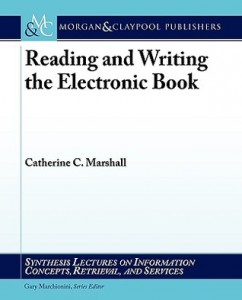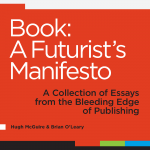Tu 3:30-5:30, South Hall 205
Professor Robert J. Glushko
glushko@berkeley.edu
Scott Abel
scottabel@mac.com
This course will emphasize the design and process issues that arise in the translation and transformation of books to digital formats, concerns that are central to the professional interests and goals of our target student population.
A great deal of research in education, cognitive science, and graphic design has been carried out on the effective selection, organization, and presentation of information. But only a little of this has been harvested and reorganized from its original context to apply to the design of enhanced ebooks, and most of that work is tightly tied to particular reading devices, which reduces its useful lifetime.
In this course we will study and learn to use the key technologies for authoring, delivering, and using ebooks, but this is a means for understanding the “what,” “why,” “when,” and “how much” questions about ebooks, not just learning “how” to create them. The overall goal of this course is to write the initial draft of the “EBook Cookbook”, a compendium that will combine design guidance and best practices from the underexploited research corpus and the experiences of the most innovative publishers of ebooks and ebook technology vendors.
We will begin with some examples of ebooks that come from different parts of the design space and we will repeatedly come back to them throughout the semester as we take a close look at the design issues and choices they illustrate. Class meetings on “The Design Space” and “The Process Space” will introduce the topics that students will write about to create the “EBook Cookbook”. In subsequent class meetings we will focus on important design and process topics twice; once to provide everyone with some baseline familiarity, and a second time four or five weeks later when the students working on those topics will have done additional research and writing to develop their own topic and to define the links and tradeoffs with other topics. In parallel with this intellectual work everyone will have learned to use a suite of authoring and publishing tools to create an ebook version of their reports.
Instructors
Professor Robert J. Glushko (http://people.ischool.berkeley.edu/~glushko/)
Scott Abel
Office Hours: TBD
Teaching/Tools Assistant
Luis Aguilar
luis@ischool.berkeley.edu
Office Hours: By appointment
Textbook and Readings
If the perfect textbook already existed, we wouldn’t need to be writing our EBook Cookbook. These books listed here span the space we are trying to fit with a more integrated work.
The DRAFT schedule that follows lists the required reading for each week of this course. A “Reading Pool” lists additional resources that are relevant to the topic and can serve as the starting point for the additional research required for the people who choose to write about that topic for the EBook Cookbook.
Required Texts
 Marshall, Catherine C. “Reading and writing the electronic book.” Synthesis lectures on information concepts, retrieval, and services 1, no. 1 (2009): 1-185 (downloadable at UCB Library via http://www.morganclaypool.com/doi/abs/ 10.2200/S00215ED1V01Y200907ICR009)
Marshall, Catherine C. “Reading and writing the electronic book.” Synthesis lectures on information concepts, retrieval, and services 1, no. 1 (2009): 1-185 (downloadable at UCB Library via http://www.morganclaypool.com/doi/abs/ 10.2200/S00215ED1V01Y200907ICR009)
 McGuire, Hugh, and Brian O’Leary. Book: A Futurist’s Manifesto: A Collection of Essays from the Bleeding Edge of Publishing. O’Reilly Media, 2011. http://shop.oreilly.com/product/0636920020325.do (readable online from the UCB Library via http://proquest.safaribooksonline.com/search?q=Futurist%20Manifesto)
McGuire, Hugh, and Brian O’Leary. Book: A Futurist’s Manifesto: A Collection of Essays from the Bleeding Edge of Publishing. O’Reilly Media, 2011. http://shop.oreilly.com/product/0636920020325.do (readable online from the UCB Library via http://proquest.safaribooksonline.com/search?q=Futurist%20Manifesto)
Recommended Texts
Both readable online from the UCB Library via (readable online from the UCB Library via http://proquest.safaribooksonline.com/search?q=epub3)
Garrish, Matt. What is EPUB 3?. O’Reilly Media, Inc., 2011. http://shop.oreilly.com/product/0636920022442.do
Garrish, Matt, and Markus Gylling. EPUB 3 Best Practices. Tools of Change, 2013. http://shop.oreilly.com/product/0636920024897.do or http://www.morganclaypool.com/doi/abs/10.2200/S00215ED1V01Y200907ICR009